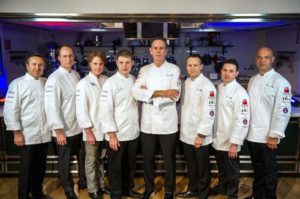On January 27-28, Chef Philip Tessier and his commis Skylar Stover of The French Laundry will go head to head with the world’s greatest chefs in the Bocuse d’Or, the most prestigious gastronomic competition in existence. Often dubbed the “Culinary Olympics,” the event is held every two years in Lyon, France and brings together the most promising chefs from 24 different countries as they cook for hours in front a live audience.
Chef Philip has been the Executive Sous Chef of The French Laundry for the past three years, overseeing the daily operations of the kitchen, and he’s been a part of the Thomas Keller Restaurant Group since he started work at Per Se in 2004. We talked to Philip all about the upcoming contest — what he’s learned from his mentors, how he’s training, and his predictions for next week in Lyon.
What was your reaction to being chosen as Team USA’s 2015 competitor?
This had always been a dream, but a dream that I watched others live. With three kids and a full-time job I simply assumed I would never have this opportunity, but when it became a reality I was overwhelmed. It took about a week for it to set in.
You attended the last Bocuse d’Or. What was your experience as a spectator like?
The support of the United States, and specifically the chefs who came and brought their support, was probably the most impactful moment for me. The noise, the intensity and the patriotism in the audience was extraordinary. I’ve never experienced anything like that before — it was incredible.
How has your work as sous chef at the French Laundry prepared you for the Bocuse d’Or?
Working at The French Laundry (TFL) requires a dedication, discipline, and determination unlike any other restaurant I have worked in. The responsibility and expectation placed on each individual forces you to grow as a chef and an individual in ways beyond just the walls of the kitchen. For the Bocuse d’Or, the same level of intensity and dedication are absolutely essential to have as a foundation. My training at TFL and with TKRG are the foundation on which this year’s training is built.
What have you learned from watching other chefs train for the competition over the years?
The most impactful observation I have had was in Sweden this past May, watching the Euro Finals. The calmness and methodical approach of the top competitors were impressive, and not the frenetic, mad dash approach I had been anticipating. Also, the best piece of advice I picked up was to do food you love and make it just that much nicer.
Tell us about the training program and what it entails.
It is a constant balance between development, refinement, and repetition. In the beginning we over-documented everything and created a lot of work for ourselves. Eventually we documented the general ideas and techniques, and when we decided to settle on one we then set out to refine it for flavor, texture, etc. as well as consistency and ease of preparation. As our time to focus on the competition has increased, we have been working six to seven days a week, 16 hours a day.
How do you work with your commis, Skylar Stover? Why did you choose him, and what set him apart from others?
The rules stipulate that the commis has to be 22 or younger at the time of the competition, so that was the first criteria to pass. Skylar showed an ability to receive direction and execute technical work consistently and accurately, which is what this competition requires. We work on ideas and practice them, and once we refine them to the level needed he works on them repeatedly until he masters them. It takes a lot of dedication and patience to work through it and not tire of the repetition.
What have been your biggest challenges in this process?
The biggest challenges to overcome are the rules, or lack thereof, in the competition. The rules seem to change every year and require an incredible amount of flexibility and adaptability in the process. Unfortunately, they changed the rules very late in the game so a lot of time, money, and effort were spent on beautiful pieces of service ware for the fish that we can no longer use because of these changes.
What about the rewards?
Working with Martin Kastner of Crucial Detail would be first and foremost. Martin has designed every mold, tool, platter, and service piece we are using. He is the most versatile, creative, and detail-oriented person I have worked with in this capacity, and our relationship was above all the most important. He has opened up a world of possibilities to me — much as he did for Alinea and Grant Achatz over the past decade.
What can other chefs and restaurants in the United States learn from following the competition?
There is much to learn if you look beyond the package that is presented by the press and media. Young chefs in our country should look deeper into the rewards and enrichment that this kind of opportunity brings an individual. When else in one’s career do you find the time to set aside and develop food and ideas in such an amazing environment?
Any predictions for the 2015 competition? What do you expect to see in Lyon?
Scandinavia, France, and the U.K. will bring some amazing food and ideas to the competition, as they have in recent years. As the underdogs, I think we will surprise everyone with what we have put together…hopefully to great results!
Watch this video from the last Bocuse d’Or competition for more information, and tune in here on January 27 to watch a live broadcast of the competition.












